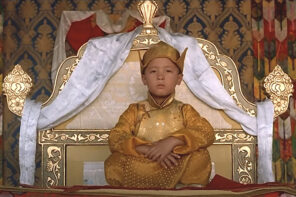A recent article from Reuters about a Muslim creationist in Istanbul, Turkey got me thinking about a conversation I just had with a Tibetan Buddhist monk in Dharamsala, India. Adnan Oktar, the Muslim creationist, who writes under the pseudonym Harun Yahya, has sent his tome Atlas of Creation, unsolicited, to hundreds of scientists and teachers in Europe and North America.
The Atlas, available online, is full of plain English and nice illustrations, containing many of the usual attacks on Darwin heard from Christian fundamentalists in this country. The author does go a bit further than most, making the intriguing assertion that all science since Darwin—including the fossil record, genetics, and the like—has successfully disproved Darwin, before going on to the usual claims that Darwinism naturally leads to atheism, terrorism, and, generally speaking, the end of the world.
It’s not so much what Oktar says, but how he says it, his tone and perspective that strike me; especially the sharp contrast to that of the young monk, Lobsang Dhondup, I was talking with earlier this month. Oktar and those with similar ideas are about refuting, disproving, and attacking evidence to segregate themselves and demonstrate why their ideas are best. Dhondup and his fellow Buddhists are about integration, exploration, and engaging evidence to enrich their own understanding and make their ideas better.
Dhondup is part of a project several colleagues and I have recently embarked on. The Dalai Lama asked that our university lead an effort to develop a comprehensive science curriculum that over the next 5-10 years would eventually be taught to all the thousands of Tibetan monks and nuns in exile in India. In the pilot we just completed, several professors and graduate students taught life sciences, neurosciences, physics, math, and science philosophy to thirty-three monks and 5 nuns.
Evolution was the first life sciences topic two of my co-teachers and I decided to focus on. For my section, the monks developed an experiment to test the hypothesis, a small piece of Darwin’s pie, that the environment affects organisms’ life characteristics. We went outdoors to three different elevations in the foothills of the Himalayas and studied the animal and plant life and their surrounding water, air, and soil. It was as we were walking down the mountain from the highest elevation that I started talking with Dhondup (several of the monks and nuns are fluent in English).
I was interested in why he was participating in this project and in how he handled issues that came up that were at odds with his Buddhist beliefs.
“I am studying modern science, because I believe it can help me understand my Buddhism better,” Dhondup said. Read that again. I was left momentarily speechless. I tried to imagine anyone I knew, anyone from the West—Christian, Jew, or Muslim—making such an amazing assertion. Just think of the dramatic difference in worldview, tone and perspective, in its approach to life, Dhondup’s thought represents—how different it is from Oktar’s. I was stunned.
I was walking down a mountain in India with a guy wearing a robe and sandals, a guy from an ancient world easily perceived as irrelevant, who had a wisdom beyond any I had previously experienced.
Buddhism turns modern Judeo-Christian ideas on their heads. In Buddhism, experience and reasoning come first, and then scripture. As we wandered down the path of broken rock fragments, Dhondup told me that when he encounters something that disagrees with his beliefs, he tests the new idea with logical evidence and approaches, and then if it holds up, he accepts it. This is what the Dalai Lama means when he says that if modern science presents good evidence that a Buddhist idea is wrong, he will accept the modern science (he gives the example of the Earth moving around the sun, which runs counter to Buddhist scripture).
Perhaps creationists think they are using logic and experience to disprove Darwin with exhibitions like those in creationist museums and statements from Oktar’s Atlas such as:
“Facts can no longer be concealed and swept aside, as was the case in Darwin’s time. Genetics, microbiology, paleontology, geology and all other branches of science constantly reveal a truth that Darwin and the supporters of Darwinism never wanted and perhaps never expected—the fact of creation.”
I don’t know.
Of course all Westerners of faith aren’t like Oktar. Nor is it true that all creationists reject science (see, for example, this recent New York Times piece). And I’m not saying that any religion is better than the other. But this idea of being open to all knowledge because it could potentially enrich your own beliefs? No matter who you are or what you believe—that’s something to think about.




